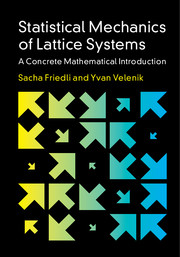Book contents
- Frontmatter
- Dedication
- Contents
- Preface
- Conventions
- 1 Introduction
- 2 The Curie–Weiss Model
- 3 The Ising Model
- 4 Liquid–Vapor Equilibrium
- 5 Cluster Expansion
- 6 Infinite-Volume Gibbs Measures
- 7 Pirogov–Sinai Theory
- 8 The Gaussian Free Field on Zd
- 9 Models with Continuous Symmetry
- 10 Reflection Positivity
- Appendix A Notes
- B Mathematical Appendices
- C Solutions to Exercises
- References
- Index
Preface
Published online by Cambridge University Press: 17 November 2017
- Frontmatter
- Dedication
- Contents
- Preface
- Conventions
- 1 Introduction
- 2 The Curie–Weiss Model
- 3 The Ising Model
- 4 Liquid–Vapor Equilibrium
- 5 Cluster Expansion
- 6 Infinite-Volume Gibbs Measures
- 7 Pirogov–Sinai Theory
- 8 The Gaussian Free Field on Zd
- 9 Models with Continuous Symmetry
- 10 Reflection Positivity
- Appendix A Notes
- B Mathematical Appendices
- C Solutions to Exercises
- References
- Index
Summary
Equilibrium statistical mechanics is a field that has existed for more than a century. Its origins lie in the search for a microscopic justification of equilibrium thermodynamics, and it developed into a well-established branch of mathematics in the second half of the twentieth century. The ideas and methods that it introduced to treat systems with many components have now permeated many areas of science and engineering, and have had an important impact on several branches of mathematics.
There exist many good introductions to this theory designed for physics undergraduates. It might, however, come as a surprise that textbooks addressing it from a mathematically rigorous standpoint have remained rather scarce. A reader looking for an introduction to its more advanced mathematical aspects must often either consult highly specialized monographs or search through numerous research articles available in peer-reviewed journals. It might even appear as if the mastery of certain techniques has survived from one generation of researchers to the next only by means of oral communication, through the use of chalk and blackboard…
It seems a general opinion that pedagogical introductory mathematically rigorous textbooks simply do not exist. This book aims at starting to bridge this gap. Both authors graduated in physics before turning to mathematical physics. As such, we have witnessed this lack from the student's point of view, before experiencing it, a few years later, from the teacher's point of view. Above all, this text aims to provide the material we would have liked to have had at our disposal when entering this field.
Although we hope that it will also be of interest to students in theoretical physics, this is in fact a book on mathematical physics. There is no general consensus on what this term actually refers to. In rough terms, what it means for us is: the analysis of problems originating in physics, at the level of rigor associated with mathematics. This includes the introduction of concepts and the development of tools enabling such an analysis. It is unfortunate thatmathematical physics is often held in rather low esteem by physicists, many of whom see it as useless nitpicking and as dealing mainly with problems that they consider to be already fully understood. There are, however, very good reasons for these investigations.
Information
- Type
- Chapter
- Information
- Statistical Mechanics of Lattice SystemsA Concrete Mathematical Introduction, pp. xv - xviiPublisher: Cambridge University PressPrint publication year: 2017
